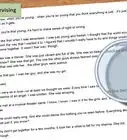This article was co-authored by Ben Whitehair. Ben Whitehair is a Social Media Expert and the Chief Operating Officer (COO) of TSMA Consulting. With over a decade of experience in the social media space, he specializes in leveraging social media for business and building relationships. He also focuses on social media’s impact on the entertainment industry. Ben graduated summa cum laude from The University of Colorado at Boulder with BAs in Theatre and Political Science as well as a Leadership Certificate. In addition to his work as CIO, Ben is a certified business and mindset coach and National Board Member of SAG-AFTRA. He is also a successful entrepreneur as the Co-Founder of Working.Actor, the premier business academy and coaching community for actors.
There are 9 references cited in this article, which can be found at the bottom of the page.
wikiHow marks an article as reader-approved once it receives enough positive feedback. In this case, 80% of readers who voted found the article helpful, earning it our reader-approved status.
This article has been viewed 115,036 times.
With the right preparation, you can excel at your audition and get the part of your dreams. Be sure to research the part, the character, and the director. Practice as much as possible for your audition. Before your audition, sleep well, eat breakfast, and dress comfortably yet neutrally. Break a leg!
Steps
Researching the Part
-
1Familiarize yourself with the overview of the show or production. Research the show or production to learn more about the history or nature of the performance. Knowing all of the players or parts and understanding the tone and style of the play will help you get into the role and excel during the audition. Read everything you can find regarding the part and the audition.
- If you can't find much information on the part itself, try to research the director to understand their other works. This will still give you an inside understanding at what they may expect.[1]
- Go to the library and find books on the play or event.
- Read the entire play multiple times to familiarize yourself with the content.
- Search Google for similar music or dance performances.
-
2Research the role so you understand the character’s arc. Research the particular character or role as much as you can. This will help you get into character even before you start practicing lines. Understanding the character or role will help you nail the scene you’re assigned because you deeply understand the character or role.[2]
- For music auditions, you can look into your instrument or member's significance. For example, if you are trying out for an indie rock band, what was their last drummer like? Where does the band find their musical inspiration?
- For dance auditions, You can research your part in relation to the performance. Are you the dance lead, or a supporting dancer? For example, If you are auditioning for the lead part in Swan Lake, look up who has played this part before and what qualities the part embodies (such as graceful).
- For theater auditions, if you are trying out for Ophelia’s role in Hamlet, look up who she was, what she did in the play, and the historical significance of her character.
- Also think about how your character might walk, dress, and speak, and try to incorporate those traits into your performance as much as you can to make it extra layered.[3]
Advertisement -
3Learn about the director and the casting agent. Research who they are, their background, and other gigs worked on. You will feel more comfortable putting a face to a name and having a sense of familiarity with who you are auditioning for.[4]
- Type the director or name of the play into Google and see what you can find. Ask other actors or casting directors if they are familiar with the character or the director.
- For dance auditions, contact the rehearsal director.
- For music auditions, you can learn about the conductor and composer.
Practicing for the Audition
-
1Memorize your lines, songs, or music. Start memorizing your part as far in advance as you can. Memorize your lines or music exactly as you will be performing them in the audition. Practice your lines or your music over and over until you know it by heart.[5] [6]
- If you are unfamiliar with a word, look it up and familiarize yourself.
- If a part is particularly tricky, give yourself extra time to perfect it.
- If you are asked to "cold read" either lines or music, don't sweat it! Stay focused on the lines or the music and get into the part.
- If you're supposed to do a monologue for the audition, pick one that isn't frequently performed or that wasn't originally part of an iconic performance or film.[7]
-
2Rehearse with friends or in front of a mirror. Saying your lines, playing the music, or practicing your dance routine in advance will help you confidently deliver your part during the audition. Find friends to rehearse lines with, reading off of the script.[8] You can also recite your part or practice your choreography in front of a mirror.
- Also practice improvising your lines and going off book.
-
3Get into character by altering your accent, body language, or clothing if necessary. The audition is based around how well you can get into your role, whether it be a dance, character, or musical performance. Embody your role by using an accent, altering your body language, or using props. [9]
- If you are auditioning for a guitar part, be the guitarist. Be confident and bold, and don’t worry if all eyes are on you during a solo.
- If you are auditioning for a play, ask yourself what the character would say or do. Infer as much as you can as if you were the character.
-
4Practice sight-reading so you are prepared for anything. Sight-reading, or “cold reading,” is reading material with little or no time to prepare in advance. In some auditions, you will perform music or recite lines without reviewing them before. Practice auditioning with unfamiliar work to become comfortable with sight-reading during your audition.[10]
- Find an unfamiliar play and practice acting out lines.
- Grab a piece of sheet music and start playing without looking at the entire piece.
Getting Physically Ready for the Audition
-
1Get at least 8 hours of sleep the night before. Try to sleep for at least 8 hours so you are well-rested and wake up refreshed. Sleeping well will ensure you perform as best as you can during your audition.[11]
- If you are nervous for your big day, try going to bed early, meditating before bed, and keeping your room dark.[12]
-
2Eat a large, balanced meal with protein before your audition. Try to eat something with protein for energy, though don’t overstuff yourself. Some auditions last a long time, so eating high-energy food will help you keep your energy up throughout the audition process.[13]
- Eggs and fruit are good choices for breakfast.
- For lunch, try a large salad with nuts or fish.
-
3Avoid consuming dairy, coffee, or spicy foods before singing auditions. Foods with dairy produce mucous which can alter the sound of your voice. Coffee and spicy foods are harsh on the throat and not conducive to singing.
-
4Dress comfortably yet professionally in neutral, flattering clothing. Wear something you will feel comfortable and confident in but that doesn’t grab too much attention. Avoid dressing in costume; you will be styled to fit the part later. You want to look professional and neutral so you can fit any role.[14]
- Avoid wearing bulky jewelry, or choosing loose clothing.
- Wear shoes that are closed-toed, lightweight, and comfortable, like flats or sneakers. Do not wear flip flops
- If you are auditioning for a music role, tailor your outfit to fit the genre while still looking professional. For example, if you are trying out for a rock band, wear a black button-down shirt.
-
5Style your hair to flatter your face. With whatever hairstyle, make sure it flatters your face rather than hiding your features. Comb your hair out of your face or tie up your hair in a ponytail.[15]
- You can also use small clips or bobby pins to help hold hair off your face if need be.
Trying out for the Part
-
1Come early and know what to expect. Arrive at your audition at least 15 minutes early to show your initiative and time management. Be prepared to answer questions about yourself and your schedule. Review the audition notice to make sure you know the audition guidelines.[16]
- Check in when you arrive and be ready to audition at any time. You never know the schedule the casting director is working with.
- Introduce yourself and the part you are auditioning for.
- Expect to audition with the casting director, a cameraman, and a reader. There may be directors, producers, and associates in the room with you. Be prepared to audition in front of any number of people.
- Be ready to alter your prepared material and to "cold read."
-
2Clear your schedule so you aren’t worried about timing. Eliminate any stress or worry during the day of your audition. If you can, don’t schedule other arrangements into your day. Have time to arrive early and stay late.[17]
- Expect delays in the audition process. Some auditions run over their time, and some applicants will show up late.
-
3Improvise if you forget your lines. If you forget a line of the monologue, fake it. It is better to improvise than to freeze. This will show the casting director that you are flexible and can roll with the punches. Most won't even notice and the ones who do will appreciate your creativity and ability to keep your performance going under duress.
- You can do this for music and dance auditions, as well as theater. If you forget your music, try to improvise something similar on the spot. If you are dancing and go out of your sequence, improvise your moves until you get back on track. This will at least show your creativity and ability to adapt.
- Some acting techniques even involve being deliberately improvisational, instinctive, moment to moment, and out of your head as an actor.[18]
-
4Act and speak with confidence in yourself. You’ve practiced the part, you’ve done the research, now it is time to show them what you can do! Act confidently as you arrive at the audition, and know that you will do the best you can.[19]
-
5Be patient when waiting for a decision. You never know what schedule the directors are working on. You could receive a call back that same day, or weeks or years later. Be patient and don't worry if you don't get a call back immediately![20]
- It is not common to contact the director or casting agent about the status of your audition. They live very busy lives.
- Though, you can request feedback on your audition. After the cast list is posted, you should submit a request within 1 week. You will typically receive feedback within 1 month, though this varies. You can get feedback on your strengths, weaknesses, and ways to improve.
Expert Q&A
Did you know you can get premium answers for this article?
Unlock premium answers by supporting wikiHow
-
QuestionHow can I do better at auditions if I don't have experience?
 Ben WhitehairBen Whitehair is a Social Media Expert and the Chief Operating Officer (COO) of TSMA Consulting. With over a decade of experience in the social media space, he specializes in leveraging social media for business and building relationships. He also focuses on social media’s impact on the entertainment industry. Ben graduated summa cum laude from The University of Colorado at Boulder with BAs in Theatre and Political Science as well as a Leadership Certificate. In addition to his work as CIO, Ben is a certified business and mindset coach and National Board Member of SAG-AFTRA. He is also a successful entrepreneur as the Co-Founder of Working.Actor, the premier business academy and coaching community for actors.
Ben WhitehairBen Whitehair is a Social Media Expert and the Chief Operating Officer (COO) of TSMA Consulting. With over a decade of experience in the social media space, he specializes in leveraging social media for business and building relationships. He also focuses on social media’s impact on the entertainment industry. Ben graduated summa cum laude from The University of Colorado at Boulder with BAs in Theatre and Political Science as well as a Leadership Certificate. In addition to his work as CIO, Ben is a certified business and mindset coach and National Board Member of SAG-AFTRA. He is also a successful entrepreneur as the Co-Founder of Working.Actor, the premier business academy and coaching community for actors.
Social Media Expert
-
QuestionI'm auditioning for a Frozen play. I want to be Elsa, but my friends say that I would make a better troll. What should I do?
 wikiHow Staff EditorThis answer was written by one of our trained team of researchers who validated it for accuracy and comprehensiveness.
wikiHow Staff EditorThis answer was written by one of our trained team of researchers who validated it for accuracy and comprehensiveness.
Staff Answer wikiHow Staff EditorStaff AnswerYour friends are probably trying to help you play to your strengths. If you're a funny, interesting and wise person, then it's possible they think you'll have a lot more fun with the troll role than the Elsa role. However, at the end of the day, you are not your friends and it's what you want to audition for that really matters. If you want to try out for Elsa, then go for it. You could always try out for the troll role as well, if that's an option.
wikiHow Staff EditorStaff AnswerYour friends are probably trying to help you play to your strengths. If you're a funny, interesting and wise person, then it's possible they think you'll have a lot more fun with the troll role than the Elsa role. However, at the end of the day, you are not your friends and it's what you want to audition for that really matters. If you want to try out for Elsa, then go for it. You could always try out for the troll role as well, if that's an option. -
QuestionI'm going to be auditioning for a play and I'm not feeling confident. Four of my friends with amazing voices are also auditioning, and I really want the main role. What can I do?
 Community AnswerIt's hard, but just focus on you. Don't worry about what your friends are doing. You never know what the director will be looking for, maybe you have that special something. Practice your singing and acting, be as prepared as possible for the audition, and go in and do your best. If you don't get the lead, accept it and move on. There will be plenty of other performances.
Community AnswerIt's hard, but just focus on you. Don't worry about what your friends are doing. You never know what the director will be looking for, maybe you have that special something. Practice your singing and acting, be as prepared as possible for the audition, and go in and do your best. If you don't get the lead, accept it and move on. There will be plenty of other performances.
Warnings
- Do not trash talk other performers who are at the audition. Not only will the directors find out, this will result in others not wanting to work with you, which damages your reputation and prevents you from enjoying future opportunities.⧼thumbs_response⧽
- Do not be rude to anyone backstage (e.x. sound booth, stage manager, costumes). This will severely damage your reputation and make the experience less enjoyable.⧼thumbs_response⧽
- Do not attempt to use bribes to get a part. It doesn't work and can ruin your reputation, as well as undermine your value and talent as a performer.⧼thumbs_response⧽
References
- ↑ https://www.backstage.com/advice-for-actors/backstage-experts/21-things-make-casting-directors-happy-audition-room/
- ↑ https://www.backstage.com/advice-for-actors/backstage-experts/21-things-make-casting-directors-happy-audition-room/
- ↑ Jim Jarrett. Acting Teacher. Expert Interview. 28 April 2020.
- ↑ https://www.backstage.com/advice-for-actors/backstage-experts/21-things-make-casting-directors-happy-audition-room/
- ↑ Ben Whitehair. Acting Coach. Expert Interview. 3 June 2021.
- ↑ http://www.byui.edu/theatre/get-involved/auditions
- ↑ Jim Jarrett. Acting Teacher. Expert Interview. 28 April 2020.
- ↑ Ben Whitehair. Acting Coach. Expert Interview. 3 June 2021.
- ↑ http://www.byui.edu/theatre/get-involved/auditions
- ↑ https://actinginlondon.co.uk/how-to-be-amazing-at-cold-reading/
- ↑ http://www.dummies.com/careers/find-a-job/how-to-prepare-for-an-acting-audition/
- ↑ https://www.bicycling.com/training/tips/7-ways-to-get-a-good-nights-sleep-when-youre-anxious/slide/7
- ↑ https://www.backstage.com/magazine/article/superfoods-eat-audition-8278/
- ↑ http://www.byui.edu/theatre/get-involved/auditions
- ↑ http://www.byui.edu/theatre/get-involved/auditions
- ↑ http://www.byui.edu/theatre/get-involved/auditions
- ↑ http://www.dummies.com/careers/find-a-job/how-to-prepare-for-an-acting-audition/
- ↑ Jim Jarrett. Acting Teacher. Expert Interview. 28 April 2020.
- ↑ Ben Whitehair. Acting Coach. Expert Interview. 3 June 2021.
- ↑ http://www.castittalent.com/blog/2011/08/what-to-expect-your-first-audition/
About This Article
To prepare for an audition, start by practicing your lines or music as early as you can so that you know them by heart. Additionally, spend time getting into character by changing your accent, clothing, or body language if necessary. You should also rehearse in front of friends if you can, or with a mirror, which will help you perform more confidently. Then, get at least 8 hours of sleep the night before the audition, and eat a balanced meal with some extra protein for energy before you go. For more tips on preparing for an audition, including researching the role and the people you’ll be auditioning for, read on!
























-Step-14.webp)





















































